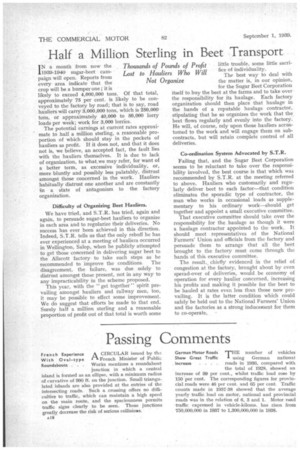Half a Million Sterling in Beet Transport
Page 20

If you've noticed an error in this article please click here to report it so we can fix it.
I N a month from now the 1939-1944) sugar-beet campaign will open. Reports from every area indicate that the crop will be a bumper one ; it is likely to exceed 4,000,000 tons. Of that total, approximately 75 per cent. is likely to be conveyed to the factory by road; that is to say, road hauliers will carry 3,000,000 tons, which is 250,000 tons, or approximately 40,000 to 50,000 lorry loads per week; work for 3,000 lorries. The potential earnings at current rates approximate to half a million sterling, a reasonable proportion of which should stay in the pockets of hauliers as profit. If it does not, and that it does not is, we believe, an accepted fact, the fault lies with the hauliers themselves. It is due to lack of organization, to what we may refer, for want of a better term, as excessive individuality, or, more bluntly and possibly less palatably, distrust amongst those concerned in the work. Hauliers habitually distrust one another and are constantly in a state of antagonism to the factory organization.
Difficulty of Organizing Beet Hauliers.
We have tried, and S.T.R. has tried, again and again, to persuade sugar-beet hauliers to organize in each area and to regularize their deliveries. No success has ever been achieved in this direction. Indeed, S.T.R. tells us that the only rebuff he has ever experienced at a meeting of hauliers occurred in Wellington, Salop, when he publicly attempted to get those concerned in delivering sugar beet to the Allscott factory to take such steps as he xecommended to improve the conditions. The disagreement, the failure, was due solely to distrust amongst those present, not in any Way to any impracticability in the scheme proposed.
This year, with the "get together" spirit prevailing amongst hauliers and railway men, too, it may be possible to effect some improvement. We do suggest that efforts be made to that end. Surely half a million sterling and a reasonable proportion of profit out of that total is worth some little trouble, some little sacrifice of individuality.
The best way to deal with the matter is, in our opinion, for the Sugar Beet Corporation itself to buy the beet at the farms and to take over the responsibility for its haulage. Each factory organization should then place that haulage in the hands of a reputable haulage contractor, stipulating that he so organizes the work that the beet flows regularly and evenly into the factory. He will, of course, rely upon those hauliers accustomed to the work and will engage them on subcontracts, but will retain complete control of all deliveries.
Co-ordination System Advocated by S.T.R.
Failing that, and the Sugar Beet Corporation seems to be reluctant to take over the responsibility involved, the best course is that which was recommended by S.T.R. at the meeting referred to above. Hauliers who customarily and regularly deliver beet to each factor—that condition eliminates the sporadic type of contractor, the man who works in occasional loads as supplementary to his ordinary work--should get together and appoint a small executive committee.
That executive committee should take over the responsibility for the haulage as though it were a haulage contractor appointed to the work. It should meet representatives of the National Farmers' Union and officials from the factory and persuade them to arrange that all the beet brought to the factory must come through the hands of this executive committee.
The result,. chiefly evidenced in the relief of congestion at the factory, brought about by even spread-over of deliveries, would be economy of operation for every haulier concerned, increasing his profits and making it possible for the beet to be hauled at rates even less than those now prevailing. It is the latter condition which could safely be held out to the National Farmers' Union and the factories as a strong inducement for them to co-operate. •




































































